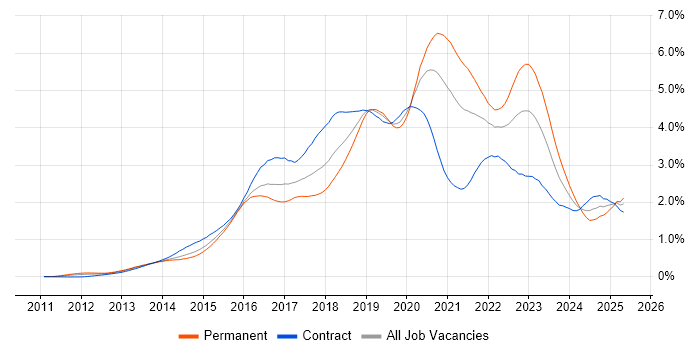Development Operations Engineer
Central London > City of London
The median Development Operations Engineer salary in the City of London is £70,000 per year, according to job vacancies posted during the 6 months leading to 22 February 2026.
The table below compares current salary benchmarking and summary statistics with the previous two years.
| 6 months to 22 Feb 2026 |
Same period 2025 | Same period 2024 | |
|---|---|---|---|
| Rank | 75 | 118 | 82 |
| Rank change year-on-year | +43 | -36 | -36 |
| Permanent jobs requiring a DevOps Engineer | 64 | 40 | 98 |
| As % of all permanent jobs in the City of London | 2.27% | 1.61% | 3.13% |
| As % of the Job Titles category | 2.41% | 1.77% | 3.27% |
| Number of salaries quoted | 58 | 32 | 88 |
| 10th Percentile | £56,250 | £58,125 | £62,125 |
| 25th Percentile | £62,500 | £70,000 | £71,875 |
| Median annual salary (50th Percentile) | £70,000 | £98,750 | £90,000 |
| Median % change year-on-year | -29.11% | +9.72% | +12.50% |
| 75th Percentile | £90,000 | £112,500 | £105,000 |
| 90th Percentile | £100,000 | £115,000 | £115,000 |
| Central London median annual salary | £70,000 | £97,500 | £90,000 |
| % change year-on-year | -28.21% | +8.33% | +12.50% |
All Permanent IT Job Roles
City of London
For comparison with the information above, the following table provides summary statistics for all permanent IT job vacancies in the City of London. Most job vacancies include a discernible job title that can be normalized. As such, the figures in the second row provide an indication of the number of permanent jobs in our overall sample.
| Permanent vacancies in the City of London with a recognized job title | 2,651 | 2,261 | 2,997 |
| % of permanent jobs with a recognized job title | 94.17% | 91.28% | 95.66% |
| Number of salaries quoted | 1,944 | 1,495 | 2,649 |
| 10th Percentile | £42,500 | £41,750 | £40,000 |
| 25th Percentile | £57,500 | £55,000 | £52,500 |
| Median annual salary (50th Percentile) | £77,500 | £75,000 | £72,500 |
| Median % change year-on-year | +3.33% | +3.45% | -3.33% |
| 75th Percentile | £100,000 | £95,000 | £96,250 |
| 90th Percentile | £102,500 | £117,500 | £113,750 |
| Central London median annual salary | £77,500 | £72,500 | £72,500 |
| % change year-on-year | +6.90% | - | -3.33% |
DevOps Engineer
Job Vacancy Trend in the City of London
Historical trend showing the proportion of permanent IT job postings featuring 'DevOps Engineer' in the job title relative to all permanent IT jobs advertised in the City of London.

DevOps Engineer
Salary Trend in the City of London
Salary distribution trend for DevOps Engineer job vacancies in the City of London.

DevOps Engineer
Salary Histogram in the City of London
Salary distribution for jobs citing DevOps Engineer in the City of London over the 6 months to 22 February 2026.
DevOps Engineer Skill Set
Top 30 Co-Occurring Skills & Capabilities in the City of London
For the 6 months to 22 February 2026, DevOps Engineer job roles required the following skills and capabilities in order of popularity. The figures indicate the absolute number of co-occurrences and as a proportion of all permanent job ads across the City of London region featuring DevOps Engineer in the job title.
|
|
DevOps Engineer Skill Set
Co-Occurring Skills & Capabilities in the City of London by Category
The following tables expand on the one above by listing co-occurrences grouped by category. They cover the same employment type, locality and period, with up to 20 co-occurrences shown in each category:
